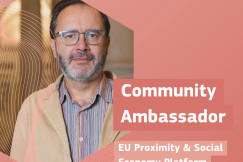Best practices
30 June 2025
OECD Private Philanthropy for Development: Data for Action dashboard
Best practices
30 June 2025
Financing the ecosystem
Partnerships
Transformative Digital Transition
+25 more
Login / create an account to be able to react
-
10

The OECD Private Philanthropy for Development: Data for Action dashboard is a global tool designed to close a critical information gap in the philanthropic sector. By providing reliable, comparable, and publicly accessible data on philanthropic funding for development, it enhances transparency and fosters greater collaboration between philanthropic foundations and their partners.
Topics
Albania
Armenia
Austria
Belgium
Bosnia and Herzegovina
Bulgaria
Croatia
Cyprus
Czechia
Denmark
Estonia
EU-27
Finland
France
Georgia
Germany
Greece
Hungary
Iceland
Ireland
Italy
Kosovo
Latvia
Liechtenstein
Lithuania
Luxembourg
Malta
Moldova
Montenegro
Netherlands
North Macedonia
Norway
Poland
Portugal
Romania
Serbia
Slovakia
Slovenia
Spain
Sweden
Switzerland
Türkiye
Ukraine
Other
Academic / Research and VET Institutions
Business Support Organisation
Company with 250 or more employees
Cluster Organisations
Consumer Organisations
Cultural and Heritage Organisations
Destination Management & Marketing Organisations
EU Institutions
Financial Institutions and Investors
Industry Associations and Chambers of Commerce
International Organisations
Local Authorities
Media / Journalist Organisations
National authorities
Networks and Federations / Confederations
NGOs / Non-profits
Notified Bodies
Regional Authorities
SMEs (a company with less than 250 employees)
Social Economy Entity
Trade Unions
Other
-
Thematic area
-
-
Financing the ecosystem
-
Partnerships
-
Transformative Digital Transition
-
-
Interlinkages with other sectors
-
-
Proximity and social economy
-
Agri-food
-
Construction
-
Cultural and creative industries
-
Digital
-
Electronics
-
Energy intensive industries
-
Energy-renewables
-
Health
-
Mobility, transport, automotive
-
Retail
-
Textile
-
Tourism
-
Aerospace and defence
-
-
Action areas and keywords
-
-
Creating financial incentives and supportive regulation for green and circular social economy business models
-
Data Maturity and data driven business models
-
Data sharing, Data management & Code of Conduct
-
Digital Platforms
-
Digital social innovation
-
Strategy for Data
-
Supporting Digital Social Innovation & Tech for Good entrepreneurship
-
Tech for Good
-
-
Ecosystem focus
-
-
Proximity economy
-
Social economy
-
-
Scope of activity
-
-
International
-
Share
Hosted within an interactive RShiny dashboard, the platform allows users to explore detailed grant-level data that underpin the OECD Centre on Philanthropy’s reports. Users can access and analyse data by geography, sector, funding source, and recipient organisation, or download the cleaned dataset for further research and strategic planning. This makes it an essential resource not only for researchers and policymakers, but also for foundations seeking potential collaborators and opportunities for co-funding.
The data is collected through a structured grant-level questionnaire sent to major international and domestic philanthropic foundations with a focus on promoting economic development and welfare in developing countries. To reduce reporting burden and ensure accuracy, certain fields are pre-filled with publicly available information, subject to validation by the reporting foundation. Where foundations prefer not to disclose grantee-level data, a non-disclosure agreement with the OECD ensures that only anonymised, aggregated data is published—preserving both transparency and autonomy.
As the most comprehensive global repository of its kind, the database represents a vital step towards what the OECD describes as “co-opetition”—a space where collaboration and shared learning can thrive even among institutions that may also operate independently. By offering a trustworthy, well-maintained evidence base, the dashboard empowers philanthropic actors, policymakers, and researchers alike to make informed decisions and strengthen the impact of philanthropy on global development.
Trust and data integrity are central to the platform’s success. Rigorous validation and cleaning processes underpin the quality of the published data, while secure internal backups ensure long-term data stewardship. In making this resource publicly accessible and easy to navigate, the OECD affirms its commitment to building a more open, informed, and cooperative philanthropic ecosystem.
According to preliminary OECD figures released on 16 April 2025, total ODA fell by 7.1 % in real terms to USD 212.1 billion—the first decline following five years of continuous growth oecd.org+1oecd.org+1 thenewhumanitarian.org+2read.oecd-ilibrary.org+2focus2030.org+2. Humanitarian aid also decreased by nearly 9.6 % over the same period read.oecd-ilibrary.org. These trends highlight a tightening global funding environment. Having comprehensive and reliable philanthropic data, such as that found in the dashboard, is now more crucial than ever to ensure public and private funds are strategically aligned and leveraged effectively.
In addition, recent research is applying artificial intelligence—particularly machine learning and natural language processing—to improve how development and philanthropic grants are classified and understood. For instance, a new technique named BERTopic has been used to extract thematic patterns from donor project narratives, enabling deeper insights into philanthropic objectives arxiv.org. Integrating such methods with the dashboard could enrich its analytical capabilities over time.
Comments (0)
See also
-
2
Partnerships Highlights April and May 2025
- Categories
- Proximity and social economy Agri-food Construction +62 more
-
5
Transformative Digital Transition Highlights April and May 2025
- Categories
- Proximity and social economy Agri-food Construction +62 more
-
97
PSE Platform Ambassador highlight: Flaviano Zandonai and National Consortium CGM
- Categories
- Partnerships Regenerative Green Transition Skills +68 more




